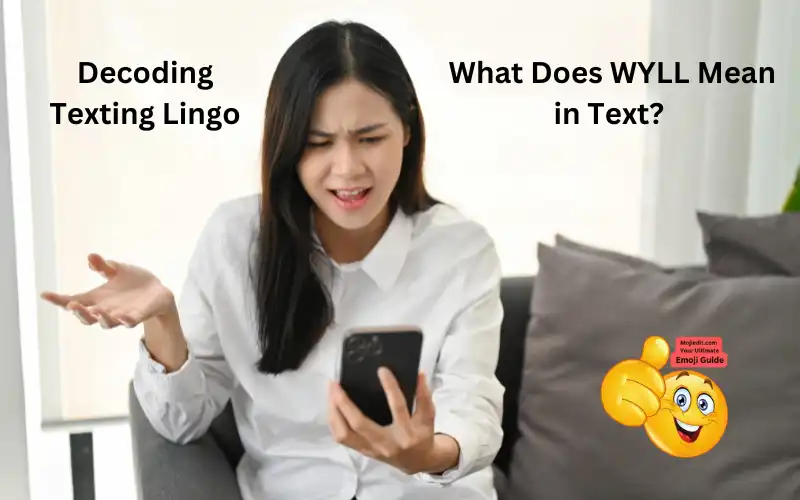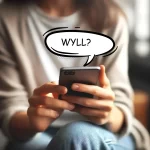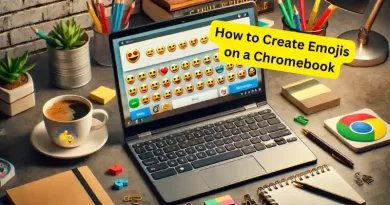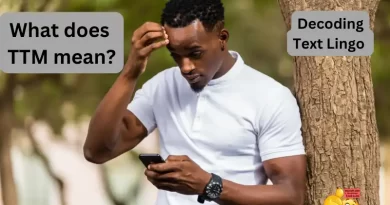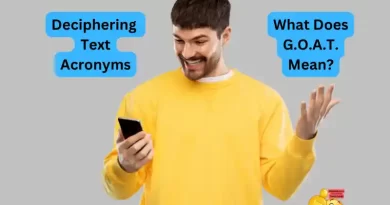What Does WYLL Mean in Text? Decoding the Texting Lingo
Introduction
In a world where texting and online communication have become the norm, it’s essential to keep up with the ever-evolving language of texting acronyms and abbreviations. These tiny expressions have the power to convey a wide range of emotions, questions, and responses in just a few characters. One such acronym that has been making the rounds in text conversations is “WYLL.”Have you ever received a message with “WYLL” and wondered what it means? Don’t worry; you’re not alone. In this article, we’ll dive into the depths of texting lingo to decode the meaning and usage of “WYLL.” We’ll explore the different variations of “WYLL,” how it’s used in conversations, potential misinterpretations, and even provide alternatives and synonyms for it.
But before we jump into the exciting world of “WYLL,” here are a few tips to keep in mind while navigating the vast landscape of texting acronyms:
Tips for Navigating Texting Acronyms
- Context Matters: The meaning of texting acronyms can change depending on the context of the conversation. Pay attention to the overall tone and the message’s content to decipher the intended meaning of “WYLL.”
- Emojis and Punctuation: Emojis and punctuation marks often accompany acronyms to provide context. A smiley face after “WYLL” can signify a friendly inquiry, while a question mark may indicate genuine curiosity.
- Internet Slang is Dynamic: Keep in mind that texting language is constantly evolving. New acronyms and expressions emerge regularly, and the meaning of existing ones can shift over time. Staying updated is essential.
- Respect the Tone: Texting acronyms are excellent tools for casual communication, but they may not be suitable in all contexts. Use them judiciously, depending on the formality and nature of the conversation.
With these tips in mind, let’s unravel the mystery of “WYLL” and explore its meaning and usage in the world of texting.
The Basics of WYLL
“WYLL” is a texting acronym that stands for “What You Look Like.” It’s a casual, informal expression often used in text conversations, especially among friends and acquaintances. “WYLL” is typically employed as a question to inquire about someone’s current appearance or status.
It’s important to note that “WYLL” is part of a broader trend in online communication where brevity is valued. Instead of typing out the full question, “What do you look like?” or “How are you looking today?” someone might simply use “WYLL” to save time and characters.
Origins and History of “WYLL”
The history of “WYLL” is a bit challenging to trace, as many texting acronyms emerge organically from online communities, and their exact origins are often unclear. However, “WYLL” likely gained popularity in the mid-2000s, coinciding with the rise of text messaging and online chat platforms.
As with many acronyms, the primary motivation behind “WYLL” is to streamline communication. In a fast-paced digital world, people seek quicker and more convenient ways to convey their messages, and acronyms like “WYLL” help in achieving that.
How “WYLL” Fits Into the Broader Texting Culture
“WYLL” is just one example of the vast array of texting acronyms that have become an integral part of modern communication. The prevalence of smartphones and the popularity of instant messaging apps have made texting a dominant form of interaction. Consequently, a unique language has developed, one that thrives on brevity and convenience.
In the next sections, we will explore the various ways “WYLL” can be used in text, provide real-life examples, and discuss the potential misinterpretations of this acronym. We will also delve into alternatives and synonyms for “WYLL,” helping you understand when to use it over other similar expressions.
Different Variations and Usage of WYLL
Now that we’ve introduced “WYLL” and discussed its basic meaning, let’s explore the various ways this acronym can be used in text conversations. Remember that “WYLL” is known for its versatility, and its meaning may shift depending on the context and accompanying elements in the message.
-
The Classic Question: “WYLL?”
The most common usage of “WYLL” is as a straightforward question, equivalent to asking someone, “What do you look like?” This question is often used when two individuals are chatting and want to know how the other person is dressed or presenting themselves at that moment. It’s a casual and friendly way to initiate a conversation or check in on someone’s appearance.
For example:
- You: “Hey, I’m heading to the party. WYLL?”
- Friend: “I’m in a black dress, feeling fancy!”
-
The Friendly Inquiry: “WYLL :)”
Adding a smiley face or other emoticon after “WYLL” can change the tone of the message. In this case, it’s more of a friendly inquiry. It’s often used to ask about someone’s appearance in a lighthearted and nonchalant manner.
For example:
- You: “Just got back from shopping. WYLL? :)”
- Friend: “I’m in my PJs with a messy bun!”
-
The Catch-Up: “Hey, WYLL?”
Sometimes, “WYLL” is used as a conversation starter or as a way to catch up with someone. It’s a simple and direct way to check in on their current situation and perhaps transition into a broader conversation.
For example:
- You: “It’s been a while. Hey, WYLL?”
- Friend: “Not much, just watching a movie.”
-
The Casual Check-In: “WYLL, babe?”
Adding terms of endearment or affectionate words like “babe,” “honey,” or “love” after “WYLL” can make it more intimate and personal. In such cases, it’s often used between close friends or partners to express genuine interest in the other person’s current state.
For example:
- You: “WYLL, love?”
- Partner: “Just chilling, what about you?”
-
The Conversational Icebreaker: “Long time no talk, WYLL?”
In some situations, “WYLL” is employed as an icebreaker when reconnecting with someone after a period of silence. It’s a friendly way to rekindle a conversation and express a desire to know how they are doing.
For example:
- You: “Long time no talk! WYLL?”
- Friend: “I know, right? I’m at the beach, enjoying the sun.”
These are just a few of the many variations and ways that “WYLL” can be used in text conversations. As you can see, the acronym is flexible and can be adapted to fit the tone and context of the conversation.
Common Misinterpretations
While “WYLL” is a straightforward acronym, it can still lead to some misinterpretations, especially when it’s taken out of context or when other elements are added to the message. Here are a few potential areas where misinterpretation can occur:
-
Tone Misunderstanding
The tone of “WYLL” can be tricky to gauge, especially in the absence of accompanying emojis or context. Without these cues, it’s possible for the recipient to misinterpret the question’s intent. For instance, a simple “WYLL” could be perceived as either a friendly inquiry or a formal one, depending on the relationship between the two individuals.
-
Overthinking
Occasionally, people might overthink the meaning of “WYLL.” They may interpret it as a deeper question about their current emotional state or well-being, leading to more elaborate responses than necessary.
-
Extraneous Elements
Sometimes, individuals add unnecessary elements to the “WYLL” message, which can complicate its interpretation. For example, if “WYLL” is followed by multiple exclamation marks or unusual punctuation, the recipient might wonder if there’s a hidden meaning or sense of urgency.
-
Varying Definitions
Misunderstandings can also arise from differing interpretations of “WYLL” among individuals. Some may see it as a question about physical appearance, while others might read it more broadly, encompassing how someone is feeling or what they’re doing at the moment.
To avoid misinterpretations, it’s helpful to use “WYLL” in the right context and be mindful of the accompanying elements in your message. Adding a smiley face or context-appropriate emojis can go a long way in conveying the intended tone and meaning.
Alternatives and Synonyms
While “WYLL” is a popular texting acronym, there are alternative expressions and synonyms that serve a similar purpose in text conversations. Here are a few of them:
- Sup? – An abbreviation of “What’s up?” It’s a casual way to inquire about someone’s current situation or what they are doing.
- How’s it going? – A more formal, yet still friendly, question to ask about someone’s current status.
- What are you up to? – An expression that inquires about what the other person is currently doing or involved in.
- What’s new? – A way to ask if there have been any recent developments or changes in the person’s life.
- How are you? – A more general, friendly inquiry about the person’s well-being and state of mind.
These alternatives can be used interchangeably with “WYLL” in most contexts, depending on the tone and formality of the conversation. Choosing the right expression will help ensure clear and effective communication.
Etiquette and Appropriate Usage
“WYLL” is a versatile acronym used in casual text conversations. However, it’s crucial to be mindful of when and how you use it to maintain effective communication and show respect for the context of your conversation.
- Use Appropriate Context: “WYLL” is best suited for casual and friendly conversations among friends, family members, or acquaintances. It may not be suitable for formal or professional exchanges.
- Avoid Overusing It: Like all acronyms, “WYLL” should be used judiciously. Overusing it in a conversation can become repetitive and diminish its impact.
- Pay Attention to Tone: If you intend to convey a specific tone or mood, consider adding emojis or context to your message. For example, a smiley face can make “WYLL” sound friendlier, while a question mark can emphasize curiosity.
- Respect the Recipient: Keep in mind that not everyone may be familiar with all texting acronyms, including “WYLL.” If you’re unsure whether the recipient knows its meaning, consider providing additional context.
By following these etiquette guidelines, you can use “WYLL” effectively in your text conversations and ensure that your messages are well-received and understood.
Responding to WYLL: Clever Comebacks and Polite Replies
Hey there, lovely readers! 🌟 Today, let’s dive into the art of responding to ‘WYLL’ in texts. Understanding the vibe behind this acronym is super important, ’cause let’s be honest, no one wants to be that person who replies with a 🤔 when a 😂 was the way to go. So, whether you’re looking for a snappy comeback or a polite response, I’ve got you covered. Let’s get those texting thumbs ready!
Straightforward Responses: Keeping it Real and Respectful
- A Simple Selfie: Sometimes, a picture says a thousand words. If you’re comfy, responding with a quick selfie can be the perfect answer.
- Descriptive Text: Not into sending pics? Totally fine! A fun, descriptive message works wonders. Like, “Just chilling in my favorite hoodie, messy bun on point!” 🐰
Witty and Humorous Replies: Bring on the Laughs!
- Playful Exaggeration: Add a dash of humor! Reply with something like, “Just morphed into a unicorn, you know, the usual stuff.” 🦄
- Turn the Tables: Why not flip the script? Respond with, “WYLL? More like, what YOU look like? 😉” It’s a fun way to keep the conversation going.
A Few Tips: Texting Etiquette 101
- Context is Key: Remember, how you know the person matters. Tailor your response to fit the relationship.
- Comfort Level: Always stay within your comfort zone. If ‘WYLL’ feels too personal, it’s okay to steer the conversation elsewhere.
- Emoji Power: Never underestimate the power of emojis to convey the right tone. They’re like the cherry on top of your text sundae!
Whether you keep it simple or sprinkle in some humor, remember, the best response is one that reflects your true self. Happy texting! 💬✨
WYLL in Online Dating: Navigating Text Lingo in the World of Romance
💕 Let’s chat about something we’ve all probably stumbled upon in the digital dating world – the ‘WYLL’ text. Yep, you know the one. It pops up when you’re swiping right, trying to find Mr. or Ms. Right. So, what does it mean in the realm of online dating, and how should we handle it? Let’s swipe into this topic together!
Understanding ‘WYLL’ in the Dating Scene
-
The Initial Message: Often, ‘WYLL’ is one of the first messages you might receive. It’s a quick way for someone to get a sense of who you are, beyond your profile pics.
-
Casual or Serious?: ‘WYLL’ can be casual, but it might also hint at someone wanting to take things beyond just text. It’s like a digital version of “So, tell me about yourself.”
Etiquette of Responding to ‘WYLL’ in Dating Apps
-
Be Yourself: As always, the golden rule is to be authentic. Feel free to share a fun fact about yourself instead of a picture if that’s more your style. 🌟
-
Privacy Matters: Remember, it’s okay to keep things vague if you’re not comfortable. A simple “Just enjoying a chill night at home” can be a perfect reply.
-
Pictures Optional: Sending a picture is totally up to you. Trust your gut and only share what feels right.
The Perception of ‘WYLL’ in Online Dating
-
A Conversation Starter: For some, ‘WYLL’ is just a breezy way to break the ice. It’s like saying, “Hey, I’m interested in knowing more about you.”
-
Red Flag or Green Light?: For others, ‘WYLL’ might come off as a bit forward or lazy. It’s important to gauge how this aligns with what you’re looking for.
Final Thoughts: ‘WYLL’ and Digital Courtship
Navigating the world of online dating can be like walking through a maze of emojis and acronyms. Remember, whether you choose to answer ‘WYLL’ or not, it’s all about finding someone who resonates with your vibe and values. So, keep swiping, keep smiling, and trust your journey.
Cultural Interpretations of WYLL: Texting Across Borders
Hey, emoji aficionados! 🌍 Today, we’re globetrotting into the fascinating world of how different cultures and age groups interpret ‘WYLL’ in texting. It’s a small phrase, but oh boy, does it pack a punch across various communities! Let’s explore how this simple acronym bridges (and sometimes creates) gaps in our global village.
WYLL Through the Cultural Lens
-
Age Matters: Younger generations, especially Gen Z, are super comfy with acronyms like ‘WYLL’. For them, it’s all about quick, snappy communication. On the flip side, older folks might prefer more traditional, clear-cut language.
-
Cultural Sensitivity: In some cultures, directly asking about someone’s appearance might be seen as intrusive or forward. While in others, it’s just casual chit-chat.
‘WYLL’ in Different Languages
-
Lost in Translation: When ‘WYLL’ hops into non-English speaking cultures, it can lose its context. It’s like trying to explain why “LOL” is funny to someone who’s never used it.
-
Adaptation: Some cultures might create their own version of ‘WYLL’, molding it to fit their linguistic and social norms.
The Global Embrace of Texting Lingo
-
Universal Appeal: Acronyms like ‘WYLL’ show how digital lingo can transcend borders, creating a unique, global way of communicating.
-
Respecting Boundaries: It’s important to remember that not everyone might be on the same page with texting acronyms. When in doubt, clarity is key!
Wrapping Up: ‘WYLL’ in the Global Texting Scene
Whether ‘WYLL’ makes you nod in understanding or scratch your head in confusion, it’s a perfect example of how digital language evolves and varies around the world. As we text our way across different cultures and generations, let’s embrace the diversity and uniqueness that each one brings to the table. 🌐✨
The Evolution of Texting Language
“WYLL” is just one example of the ever-changing landscape of texting language. Texting acronyms, expressions, and slang evolve rapidly, reflecting the dynamic nature of online communication. New terms emerge, old ones adapt, and the language of texting continues to transform to meet the demands of modern communication.
The use of acronyms like “WYLL” has become a fundamental aspect of texting and instant messaging. These expressions not only save time but also foster a sense of informality and camaraderie in conversations. As texting and digital communication continue to shape our interactions, the language of texting will undoubtedly keep evolving.
Conclusion
“WYLL” stands as a representative example of the diverse and dynamic world of texting acronyms. Its simplicity and versatility make it a popular choice for those looking to connect, inquire, and engage in casual conversations. Understanding the meaning and usage of “WYLL” can help individuals navigate the digital communication landscape more effectively and maintain clear and engaging interactions with others.
As you continue your texting adventures, keep in mind the tips for navigating texting acronyms, be aware of potential misinterpretations, and use “WYLL” in a way that aligns with the context and tone of your conversations. Embrace the ever-evolving language of texting and enjoy the convenience and camaraderie it brings to your digital interactions.
Whether it’s “WYLL” or any other texting acronym, these expressions will continue to shape the way we connect and communicate in the digital age.
FAQ
‘WYLL’ is a texting acronym that means “What You Look Like.” It’s used as a casual, informal way to inquire about someone’s current appearance or status, especially in conversations among friends and acquaintances.
‘WYLL’ is versatile and can be used in various ways. Commonly, it’s a straightforward question like “What do you look like?” It can also be a friendly inquiry, a conversation starter, a casual check-in, or an icebreaker, depending on the context and accompanying elements like emojis.
Yes, ‘WYLL’ can sometimes be misinterpreted, especially if taken out of context or without accompanying emojis. Misinterpretations can arise from its tone, overthinking its meaning, adding extraneous elements, or varying definitions among individuals.
Alternatives to ‘WYLL’ include expressions like “Sup?” (short for “What’s up?”), “How’s it going?”, “What are you up to?”, “What’s new?”, and “How are you?”. These can be used interchangeably with ‘WYLL’ depending on the conversation’s tone and formality.
‘WYLL’ is best suited for casual and friendly conversations among friends, family members, or acquaintances. It may not be appropriate for formal or professional exchanges, and like all acronyms, it should be used judiciously.

